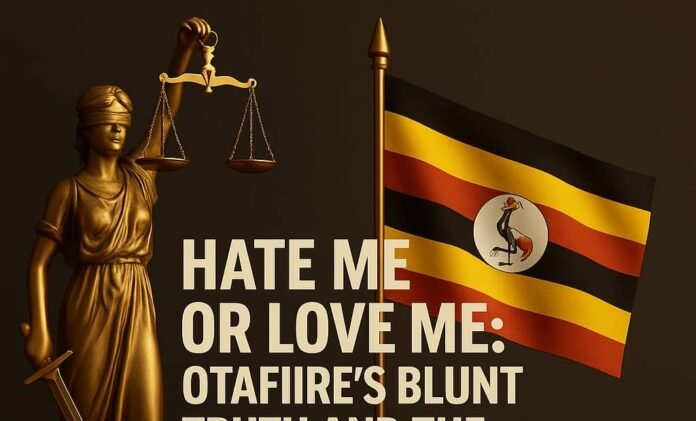By Isaac Christopher Lubogo
On the podium of the Uganda Law Society Annual Convention, at the sacred occasion of the Sam Kalega Njuba Memorial Lecture, General Kahinda Otafiire did not deliver the usual perfumed speech of a government minister. He came like a man tearing his own uniform, exposing the wounds beneath.
> “Hate me or love me,” he thundered, “but why do we continue to incarcerate Dr. Kizza Besigye and others without trial? Either try him and condemn him, or absolve him.”
The Minister Who Should Know
This was not an idle remark from a passer-by. Otafiire is the Minister of Internal Affairs, the custodian of our prisons, the overseer of the police, the very man who sits at the desk where the state’s intelligence and criminal records converge. If there is one person in Uganda who should know why Besigye is in chains, it is him.
And yet he confessed, without shame but with startling candour:
> “I don’t even know what Besigye has done wrong.”
This is the paradox that stabs at the Constitution’s heart. If the minister who holds the keys to liberty and incarceration does not know the offence, then what sustains the chains? Power? Fear? Habit? Or the sheer arrogance of impunity?
The Constitutional Crisis at Home
The Constitution of 1995 was our covenant after years of lawless rule. It guarantees liberty (Article 23) and fair trial within reasonable time (Article 28). The Supreme Court has already pronounced that civilians cannot be dragged before military courts. Yet Besigye, a civilian opposition leader, remains incarcerated, trial delayed into oblivion.
When the Minister of Internal Affairs admits ignorance of the charges, and the Attorney General — Uganda’s chief legal advisor — defends silence, then constitutional supremacy collapses into mockery. Law no longer reigns; it limps, wounded and dishonoured.
The Rebuke to the Attorney General
Otafiire’s blunt address was not aimed at the opposition benches. It was directed at the Attorney General, the constitutional watchman. The AG swore an oath to ensure government actions remain tethered to the law. And yet here was a minister asking him publicly: “On what grounds are we keeping this man in chains?”
This is not merely a political quarrel; it is a constitutional indictment. For when the Attorney General allows indefinite incarceration without trial, he becomes the undertaker of justice.
The Constitution Abroad: Uganda’s International Scar
Constitutions are not just domestic compacts; they are passports of legitimacy before the world. Uganda is a signatory to the ICCPR and the African Charter on Human and Peoples’ Rights. Both condemn arbitrary detention. The East African Court of Justice has rebuked member states for similar abuses.
So every day Besigye and others languish without trial, Uganda’s Constitution is mocked not only in Kampala but also in Addis Ababa, New York, and Geneva. We preach democracy abroad while shackling it at home. It is the hypocrisy of a doctor boasting of healing strangers while his own household bleeds.
Silence is a Sin
And so Otafiire reminded the Law Society: “Do not die in the sin of silence.” The phrase burned like fire through the hall. For silence has always been the accomplice of tyranny. Silence signed the death warrants of Obote’s critics. Silence cheered Amin’s butchers. Silence embalms injustice in robes of legality.
If lawyers, judges, and scholars remain quiet while even ministers confess ignorance of the crimes behind the chains, then Uganda ceases to be a constitutional republic. It becomes a theatre where power writes its own scripts and forces citizens to clap.
Hate Him or Love Him
“Hate me or love me” — Otafiire knew his words would sting. They cut across partisan loyalties, exposing a wound festering at the very core of Uganda’s governance. To hate him is to hate the mirror he held up. To love him is to admit that sometimes even insiders must become prophets when silence becomes betrayal.
The Final Verdict
At home, the Constitution is mocked by prolonged detentions without trial. Abroad, Uganda is judged as a state where even the minister of internal affairs does not know the crime sustaining incarceration.
This is the fire Otafiire unleashed: that if the custodian does not know the offence, then the Republic itself has no case.
> Uganda must choose: either condemn with evidence or absolve with justice. But to hold without trial is to bury the Constitution both in Kampala and in the conscience of the world.
Hate him or love him, Otafiire has spoken. The question is: will Uganda listen?








